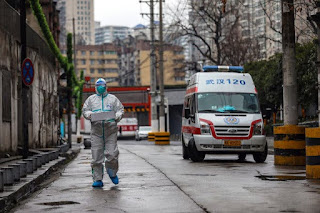#CoronaVirusOutbreak: All You Need To Know About CoronaVirus
A coronavirus is a kind of common virus that causes an infection in your nose, sinuses, or upper throat.
Severe acute respiratory syndrome (Sars) and Middle Eastern respiratory syndrome (Mers) are both caused by coronaviruses that came from animals. Although Mers is believed to be transmitted to humans from dromedaries, the original hosts for both coronaviruses were probably bats. In 2002, Sars spread virtually unchecked to 37 countries, causing global panic, infecting more than 8,000 people and killing more than 750. Mers appears to be less easily passed from human to human, but has greater lethality, killing 35% of about 2,500 people who have been infected.
Human to human transmission has been confirmed by China’s national health commission.
You could get lab tests, including nose and throat cultures and blood work, to find out whether your cold was caused by a coronavirus, but there's no reason to. The test results wouldn't change how you treat your symptoms, which typically go away in a few days.
But if a coronavirus infection spreads to the lower respiratory tract (your windpipe and your lungs), it can cause pneumonia, especially in older people, people with heart disease, or people with weakened immune systems.
You treat a coronavirus infection the same way you treat a cold:
A humidifier or steamy shower can also help ease a sore and scratchy throat.
Even when a coronavirus causes MERS or SARS in other countries, the kind of coronavirus infection common in the U.S. isn't a serious threat for an otherwise healthy adult. If you get sick, treat your symptoms and contact a doctor if they get worse or don't go away.
Severe acute respiratory syndrome (Sars) and Middle Eastern respiratory syndrome (Mers) are both caused by coronaviruses that came from animals. Although Mers is believed to be transmitted to humans from dromedaries, the original hosts for both coronaviruses were probably bats. In 2002, Sars spread virtually unchecked to 37 countries, causing global panic, infecting more than 8,000 people and killing more than 750. Mers appears to be less easily passed from human to human, but has greater lethality, killing 35% of about 2,500 people who have been infected.
The Wuhan Corona Virus
In early 2020, following a December 2019 outbreak in China, the World Health Organization identified a new type, 2019 novel coronavirus (2019-nCoV) – a member of the coronavirus family that has never been encountered before. Like other coronaviruses, it has come from animals. Many of those infected either worked or frequently shopped in the Huanan seafood wholesale market in the centre of the Chinese city, which also sold live and newly slaughtered animals. New and troubling viruses usually originate in animal hosts. Ebola and flu are examples.Human to human transmission has been confirmed by China’s national health commission.
Common Symptoms of Coronavirus
The symptoms of most coronaviruses are similar to any other upper respiratory infection, including runny nose, coughing, sore throat, and sometimes a fever. In most cases, you won't know whether you have a coronavirus or a different cold-causing virus, such as rhinovirus.You could get lab tests, including nose and throat cultures and blood work, to find out whether your cold was caused by a coronavirus, but there's no reason to. The test results wouldn't change how you treat your symptoms, which typically go away in a few days.
But if a coronavirus infection spreads to the lower respiratory tract (your windpipe and your lungs), it can cause pneumonia, especially in older people, people with heart disease, or people with weakened immune systems.
What to Do About Coronavirus
There is no vaccine for coronavirus. To help prevent a coronavirus infection, do the same things you do to avoid the common cold:- Wash your hands thoroughly with soap and warm water or with an alcohol-based hand sanitizer.
- Keep your hands and fingers away from your eyes, nose, and mouth.
- Avoid close contact with people who are infected.
You treat a coronavirus infection the same way you treat a cold:
- Get plenty of rest.
- Drink fluids.
- Take over-the-counter medicine for a sore throat and fever. But don't give aspirin to children or teens younger than 19; use ibuprofen or acetaminophen instead.
A humidifier or steamy shower can also help ease a sore and scratchy throat.
Even when a coronavirus causes MERS or SARS in other countries, the kind of coronavirus infection common in the U.S. isn't a serious threat for an otherwise healthy adult. If you get sick, treat your symptoms and contact a doctor if they get worse or don't go away.


Comments
Post a Comment
Be sociable, share your opinion!
Post a Comment :)